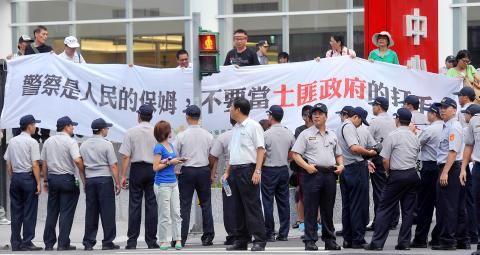|
Review of service
agreement postponed
CLOSED ‘PUBLIC HEARINGS’: Members of the public
could not observe two public hearings held yesterday after they were filled by
officials and legislative assistants
By Shih Hsiu-chuan / Staff reporter

Activists protest against the
cross-strait service trade agreement in front of the Chinese Nationalist Party’s
(KMT) headquarters in downtown Taipei yesterday.
Photo: Chien Jung-fong, Taipei Times
The preliminary legislative review of the
controversial cross-strait service trade agreement scheduled for today was
temporarily postponed and two more public hearings are to be held instead in
response to continuing opposition from the public to the legislature ratifying
the agreement.
Academics and representatives of civic groups apprehensive of opening up the
nation’s service sector to Chinese investors continued to call for lawmakers to
take citizens’ opinions into account through a deliberative democracy process
before the agreement is reviewed in the legislature.
Lawmakers from the Democratic Progressive Party (DPP) and the Taiwan Solidarity
Union have voiced support for the demand that the impact on each industry
covered by the trade agreement be discussed at a separate public hearing, with
business owners and representatives of those employed in the sector invited to
talk about their views before the legislative review begins.
The Chinese Nationalist Party (KMT) did not agree to the request.
Two separate public hearings were held yesterday by a joint committee led by the
Internal Administration Committee, entrusted by the legislature’s plenary
session to do a preliminary review of the agreement.
The preliminary review was scheduled for today, but the KMT agreed to postpone
the meeting after it turned down a request by the DPP and the TSU that
protesters rallying outside the legislature be allowed to be present at
yesterday’s public hearing as observers.
A total of 28 representatives from academia, business associations and civic
organizations were invited to present their views on the agreement, while
Mainland Affairs Council Minister Wang Yu-chi (王郁琦), Straits Exchange Foundation
(SEF) Chairman Lin Join-sane (林中森) and Minister of Economic Affairs Chang
Chia-juch (張家祝) were also present.
At the hall, which can accommodate hundreds of people, most of the seats were
taken by legislative assistants and officials from various departments.
The government signed the agreement with China without consulting affected
industries and the public, and now “you mobilized officials and legislative
assistants to occupy the seats that were supposed to belong to the people,” DPP
Legislator Lin Shu-fen (林淑芬) said.
KMT Legislator Lin Hung-chih (林鴻池) said that it was against the rules to allow
people to attend the meeting unless they have applied to attend beforehand.
At the hearing, several representatives of groups opposing the agreement
emphasized the need for lawmakers to listen to people’s opinions.
“We demand that the legislature hold a public hearing specifically for each
industry and that all related information be made available before a public
hearing is held,” Chung Yuan Christian University associate professor of
financial law Hsu Wei-chun (徐偉群) said.
The legislature should enact a law to regulate how the government assesses the
impact of trade agreements on the nation and to require the government to
present what policy it will adopt for industries covered by a trade pact
following its implementation so people can better predict how the liberalization
will affect local industries, Hsu said.
Terry Chang (張天立), president of online bookstore TAAZE and founder of
books.com.tw, said he doubted that officials involved in the negotiations have a
basic understanding of the industries covered by the agreement.
“This is not a trivial thing. I call on officials to reconsider the agreement
and politicians in both the blue and the green camps to put away partisanship to
work together to protect the country’s publishing industry,” Chang said.
|
![]()
![]()
![]()